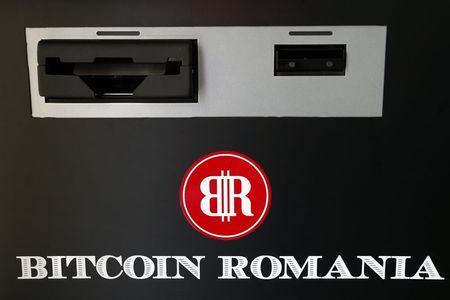By Luiza Ilie
BUCHAREST (Reuters) - In a well-lit office with red window frames in downtown Bucharest, Romania's first bitcoin ATM attracts many who until it opened in May had to buy or sell the digital currency face-to-face or through wire transfers.
The interest in bitcoin in Romania stands out in a region where national currencies are widely seen as poor substitutes for the euro.
Tech-savvy and still deeply distrustful of officialdom 25 years after the end of communism, many Romanians are unfazed by warnings about the cryptocurrency.
In the western town of Oradea, 370 miles (595 km) away from the capital, the first bitcoin exchange in the country has drawn more than 2,000 clients in the seven months since it opened, with transactions totalling 5.12 million lei ( 1 million pounds).
But Romania ranks as the European Union's second-poorest state and among the weakest in collecting taxes and fighting fraud, making it poorly equipped to manage the bitcoin.
Bitcoin is still an infant in Europe relative to the United States, where hundreds of start-ups backed by some Wall Street traders and venture capitalists have propelled consumer and media interest. Activity in virtual currencies around Europe is concentrated in London, Amsterdam and Berlin.
Romanian entrepreneurs envision a future where the bitcoin is as common as grocery shopping. But they say it needs a legal framework to gain credibility.
"It is an industry in its early stages," said George Rotariu, who opened the ATM in Bucharest in collaboration with Vancouver-based Bitcoiniacs and plans to expand to more Romanian cities. "You need a legislative framework to supply services or have a business in this field," he said.
"We groped around in the legislation and interpreted some policies," said Horea Vuscan, a local politician who owns the Oradea bitcoin operator BTCXchange.
"We are now in talks with officials because I don't know where we fit in, a bourse, bank, money transfer firm."
Bitcoin is stored entirely on computers, not backed by any government or central bank. It lets owners hold, trade and move money from place to place almost as cheaply as sending email.
INSTITUTIONAL WEAKNESS
Its use has raised concerns for governments around the world, especially after Tokyo-based Mt Gox, once the world's leading bitcoin exchange, filed for bankruptcy after saying some 850,000 bitcoins had gone missing.
A report by Bank of America last year found bitcoin showed promise as a low-cost way to do e-commerce and as an alternative to traditional money transfer services, but could also be used to evade high taxes, capital controls and confiscation.
In July, the European Banking Authority, the EU's banking watchdog, urged national policymakers to discourage credit and payment institutions from buying, holding, or selling virtual currencies pending a regulatory framework.
"Using bitcoin in Romania is not regulated and carries very large risks," said the Romanian Financial Supervision Authority (ASF). "The risk of fraud is also not to be ruled out."
It said the industry "would need to have a visible economic significance in Romania, which it does not", before regulation is considered, adding it would enforce any EU-approved rules.
Some EU states, including Finland, the United Kingdom, Germany or Poland have found ways to tax bitcoin transactions.
But Romania collects just under 60 percent of its regular tax goal. That amounts to roughly 33 percent of economic output, well below the bloc's 46 percent average.
"There is some preoccupation with bitcoin," one finance ministry official said. "But a legal framework is some time away and only after that will we analyse the need for a fiscal one."
BITCOIN VOLATILITY
The number of Romanian service providers accepting bitcoins - which are divisible to eight decimal places - has risen slowly to a handful of coffeeshops, gyms, restaurants and beauty salons, according to service tracker coinmap.org.
"I want to bring bitcoin to street level, I want everyone to have a phone app where they keep their coins and use it everywhere, in coffee shops, restaurants, grocery shops, just like a regular wallet," BTCXchange owner Vuscan said.
But before it can gain greater traction, bitcoin needs to address its volatility; it has swung from 1,170 lei ($370) to 3,406 lei ($1,100) this year, according to Oradea's BTCXchange.
Vuscan's exchange works only for Romanian leu deals, but he plans to open it to euro and dollar transactions, hoping to join larger European bitcoin exchanges such as Slovenia's Bitstamp.
BTCXchange is registered as a standard company. Vuscan enforced some safeguards - users are required to have a bank account and there are self-imposed policies against money laundering. But there are no legal or regulatory safeguards.
Bitcoin's rise in Romania is partially due to its status as one of Europe's active technology hubs. The country has attracted investors including Oracle, IBM and Intel.
But while Romania boasts pockets of super-fast internet networks, only 58 percent of households have internet access, below the EU average. A 2012 Verizon report also said Romania was the world's second-biggest hacking centre after China.

Vuscan says his exchange is safe and he will reimburse clients if their bitcoins get stolen. "I can hardly wait for them to try," he said when asked about hacker attacks. ($1 = 3.2626 Romanian lei)
(Editing by Eric Auchard and Ruth Pitchford)
2_800x533_L_1412602635.jpg)